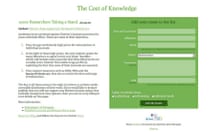It began with a frustrated blogpost by a distinguished mathematician. Tim Gowers and his colleagues had been grumbling among themselves for several years about the rising costs of academic journals.
They, like many other academics, were upset that the work produced by their peers, and funded largely by taxpayers, sat behind the paywalls of private publishing houses that charged UK universities hundreds of millions of pounds a year for the privilege of access.
There had been talk last year that a major scientific body might come out in public to highlight the problem and rally scientists to speak out against the publishing companies, but nothing was happening fast.
So, in January this year, Gowers wrote an article on his blog declaring that he would henceforth decline to submit to or review papers for any academic journal published by Elsevier, the largest publisher of scientific journals in the world.
He was not expecting what happened next. Thousands of people read the post and hundreds left supportive comments. Within a day, one of his readers had set up a website, The Cost of Knowledge, which allowed academics to register their protest against Elsevier.
The site now has almost 9,000 signatories, all of whom have committed themselves to refuse to either peer review, submit to or undertake editorial work for Elsevier journals. "I wasn't expecting it to make such a splash," says Gowers. "At first I was taken aback by how quickly this thing blew up."
Gowers, a mathematician at Cambridge University and winner of the prestigious Fields Medal, had hit a nerve with academics who were increasingly fed up with the stranglehold that a few publishing companies have gained over the publication and distribution of the world's scientific research.
The current publishing model for science is broken, argue an ever-increasing number of supporters of open access publishing, a model whereby all scientific research funded by taxpayers would be made available on the web for free.
Expensive paywalls not only waste university funds, they say, but slow down future scientific discovery and put up barriers for interested members of the public, politicians and patients' groups who need access to primary research in order to exercise their democratic rights.
Stephen Curry, a structural biologist at Imperial College London, says that scientists need to come to a new arrangement with publishers fit for the online age and that "for a long time, we've been taken for a ride and it's got ridiculous".
He adds: "We face important policy choices on a whole raft of issues – climate change, energy generation, cloning, stem cell technology, GM foods – that we cannot hope to address properly unless we have access to the scientific research in each of these areas."
Academic publishers charge UK universities about £200m a year to access scientific journals, almost a tenth of the £2.2bn distributed to them by the government, via the funding councils, for the basic running costs of university research.
Despite the recession, these charges helped academic publishers operate with profit margins of 35% or more , while getting their raw materials and the work of thousands of taxpayer- and charity-funded scientists free.
The big three publishing houses – Elsevier, Springer and Wiley – own most of the world's more than 20,000 academic journals and account for about 42% of all journal articles published. And, even as library budgets over the past few years in the UK and North America have been flat or declining, journal prices have been rising by 5-7% a year or more.
A standalone subscription to one of Elsevier's most expensive journals, Biochimica et Biophysica Acta, costs more than €18,000 (£15,000) a year. Most universities buy bundles of journals, however, so they can soon rack up bills of more than £1m each to access the journals their academics request.
"As scientists, we do let ourselves be pushed around an awful lot," says Curry, who recently stopped reviewing for Elsevier and also resigned as an academic editor on an Elsevier journal.
"We give out all this work for free to publishers and I think, just becoming aware of the huge profits that are involved, I'm much less willing to give up my time … I'm more inclined to say I'm going to devote my time and effort to journals that are more strongly open access."
Price, however, is only part of the issue. Academics and librarians are also asking themselves why publishers should have exclusive control of how research gets distributed and shared. "We think that's wrong and that's not the most effective way of running scholarly communications," says David Prosser, executive director of Research Libraries UK.
"To be made effective, scholarly information has to be made as widely available as possible. We've seen an increasing amount of evidence that shows that, if we move to an open-access world, there are benefits not just to the scientific process itself but also wider economic benefits."
Until the arrival of the web, printed peer-reviewed journals were the easiest and fastest way to keep up to speed with the ever-growing amount of research in an ever-growing number of universities around the world. But, as the numbers of journals grew, publishing companies became the de facto gatekeepers to scientific knowledge, restricting who could see the latest ideas rather than allowing ideas to spread as far as possible.
Academics submit the results of their research projects to a journal, whose editors then send the manuscript out to other academics in the same field for peer review.
If the article passes this stage, the editors often require researchers to pay hundreds or thousands of pounds if they go over a certain number of pages or if they want to include colour diagrams. Once these fees are paid, the research is published and made available, in print and online, to anyone willing to pay for access. Organising the whole process clearly takes effort, but does it justify the vast profit margins that publishing companies make?
Gowers says that publishers rarely make it explicit that the peer review they depend on for quality control is all done voluntarily and publishers are making profits on the back of this voluntary work.
"Academics write the papers, academics referee the papers, academics select the papers that are going to be published – it's almost as though the publisher does nothing that we need except perhaps their organisational role and lending the name of the journal that confers a certain reputation."
Nature, one of the world's leading cross-disciplinary scientific journals and owned by the publishing group Macmillan, charges subscriptions for access to its suite of magazines and websites.
In an editorial published in January, the journal defended the value it added to the scientific process, saying that publishing original research papers required its editors to "undertake careful assessment of scientific significance, and the refereeing stage involves much deliberation, occasional debate and revisions that significantly enhance the robustness and scientific impact of the paper".
An Elsevier spokesman said the subscription cost of research articles had "never been lower than it is today on a cost-per-download basis. This is a direct result of the investments publishers have made to digitise and disseminate scientific content." Volume discounts also meant the cost of an article was now "about one fifth of what it was just 10 years ago".
In an open letter to scientists in February, Elsevier said: "While some of the facts about Elsevier are being misrepresented, the depth of feeling among some in the research community is real and something we take very seriously."
It is easy for most research scientists to remain oblivious to the high cost of journal subscriptions, because they are not usually the ones having to negotiate with publishers, says Sir Mark Walport, director of the Wellcome Trust.
As an active researcher, he had easy access to all the papers he wanted and only became aware of the costs involved, he says, when he arrived at the trust and tried to read a paper that had been produced as a result of a research grant from the charity, only to be faced with an article charge of £25. "Not surprisingly, I felt somewhat resentful about it," he says.
Björn Brembs, a neurobiologist at Free University Berlin and an outspoken supporter of open access, says the academic community should ditch publishers altogether, giving money spent on journal subscriptions to libraries instead. Brembs's idea, a global archive of academic research and data, is a supercharged version of one method of open access already in operation.
ArXiv.org is a long-established website where anyone can post any research manuscript they like and make it available to the world for free. In some subjects, notably physics, almost everything appears here before it goes out to peer review and before publication in a scientific journal.
Another model of open access comes from the Public Library of Science (PLoS), an organisation headquartered in San Francisco.
The organisation publishes several top-tier journals, including PLoS Biology and PLoS Medicine, as well as the more general PLoS ONE, a journal that publishes on any topic that could be classed as scientific and accepts all submissions where the conclusions are supported by the presented data.
All PLoS journals are available free on the web as soon as they are published, and the costs of publication are borne by the researchers themselves – about $2,900 (£1,800) per article for PLoS Biology and PLoS Medicine and $1,350 per article for PLoS ONE.
Perhaps sensing the mood in 2011, Nature's parent company announced its own open-access journal in the mould of PLoS ONE, called Scientific Reports.
Many standard subscription-based journals will liberate their papers from paywalls if the authors pay a fee, a process known as "gold" open access. This means academics can deposit pdfs of their research on university websites or central repositories at a cost of $1,000-$5,000. For those without such funds, there is "green" open access, where a publisher might allow a researcher to deposit a peer-reviewed, though unformatted, pdf of the paper on a university database.
Even if a paper is made available on university repositories, though, often the copyright restrictions are so draconian that the research cannot be used in any subsequent scientific inquiry without prior permission.
This has profound implications for the ability of scientists to use modern techniques to get the most out of published research, which grows at the rate of more than 1.5m new research articles every year.
Text mining, for example, is a relatively new research method where computer programmes hunt through databases of plain-text research articles, looking for associations and connections – between drugs and side effects, for example, or between genes and disease – that a person scouring through papers one by one may never notice.
In March, JISC, a government-funded agency that champions the use of digital technology in UK universities for research and teaching, published a report. This said that if text mining enabled just a 2% increase in productivity for scientists, it would be worth £123m-£157m in working time per year.
But the process requires research articles to be accessed, copied, analysed and annotated – all of which could be illegal under current copyright laws.
Cameron Neylon, a biophysicist who will take up a position as director of advocacy at PLoS in July, says such copyright rules are problematic for several reasons.
"Firstly, we do a lot of reinventing the wheel because older literature isn't as accessible as it should be. We really need to be running high quality mining tools over the older literature, because there is a lot of value in there.
"The second problem is that there is so much being generated today that people can't keep up – there is simply too much to cover – and this means that we are getting more and more trapped in the silos of our own discipline and missing parallel work in the noise."
Publishers are not the only hurdle to enabling wider adoption of open access – academics themselves are too. Academics are assessed on their publication record in scientific journals and the metrics of the system mean that the more prestigious the journal, the higher the chance there is of promotion or a research grant.
This problem is exacerbated by the Research Excellence Framework (REF), an exercise carried out every few years by the UK funding councils to assess the quality of every university department.
The assessments, largely based on publication records, determine how more than £2bn is distributed every year to universities. Universities are already gearing up for their assessments as part of the REF in 2014 and, although the adjudicating panels have been instructed to ignore the impact factors of journals, Curry says no one believes that it is "remotely possible to do so".
This means a paper in Nature, Science, Cell or some other high-impact (but non-open-access) journal will count for far more in the REF assessments than the enlightened notion that scientific research should be as widely available as possible.
Neylon says the obsession among scientists, as authors, with prestige means they are making their lives as readers and consumers of research much harder than it needs to be. "Prestige is driving the form and quality of papers and not always in a good direction," he says.
But perhaps the web can provide better metrics for scientists in the future, such as download numbers, bookmarks in social bookmarking services or even tweets and Facebook likes.
"Ultimately it will be a combination of all these things together that let you answer more specific questions about how your research is being used," says Neylon. "It's very early days for these measures. But, frankly, the other measures we've used traditionally aren't very robust either."
Publishing companies will no doubt need to change in response to the call for increased open access. In response to the Cost of Knowledge petition, Elsevier said it would "create a scientific council for mathematics, to ensure that we are working in tandem with the mathematics community to address feedback and to give greater control and transparency to the community".
But Gowers doubts Elsevier could do anything bold enough to win back his support and is instead focused on ways the web might open up scientific research in future. His main hope after writing his blogpost is that people get energised to try out new ideas and set up new open access journals or web-based evaluation methods.
"A lot of people are suddenly spending a lot of time on the internet and it's a serious help to research that's going on.
"A lot more discussion goes on – the fact that I wrote a blogpost that got read by thousands of people very quickly is something that wouldn't have happened five years ago."











Comments (…)
Sign in or create your Guardian account to join the discussion